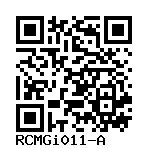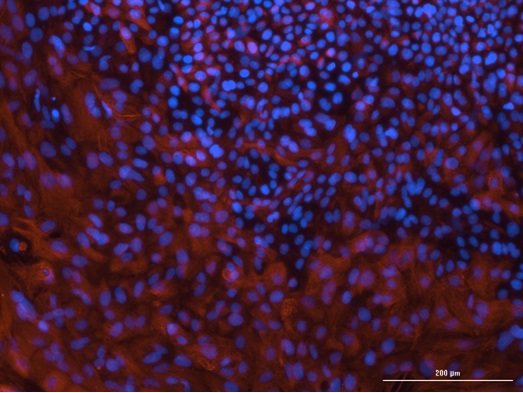P10L1
RCMGi011-A
General
Cell Line |
|
| hPSCreg name | RCMGi011-A |
| Cite as: | RCMGi011-A (RRID:CVCL_C9H9) |
| Alternative name(s) |
P10L1
|
| Cell line type | Human induced pluripotent stem cell (hiPSC) |
| Similar lines |
RCMGi011-B (P10L2) Donor diseases: Mucopolysaccharidosis Type IVB autosomal recessive nonsyndromic deafness 12 LUMCi056-A (CRB1 patient 128 compound heterozygous c.2843G>A p.(Cys948Tyr) and c.3122T>C p.(Met1041Thr), LUMC0128iCRB01) Donor's gene variants: CRB1, CRB1 Donor diseases: Retinitis Pigmentosa LUMCi027-A (LUMC0153iPKP03) Donor's gene variants: PKP2 Donor diseases: arrhythmogenic right ventricular dysplasia 9 |
| Last update | 16th January 2024 |
| User feedback | |
Provider |
|
| Generator | Research Centre for Medical Genetics (RCMG) |
External Databases |
|
| BioSamples | SAMEA112696500 |
| Cellosaurus | CVCL_C9H9 |
| Wikidata | Q123033340 |
General Information |
|
| Publications | |
| * Is the cell line readily obtainable for third parties? |
Yes Research use: allowed
Clinical use: not allowed
Commercial use: not allowed
|
Donor Information
General Donor Information |
|
| Sex | male |
| Ethnicity | Caucasian |
Phenotype and Disease related information (Donor) |
|
| Diseases | A disease was diagnosed.
|
Karyotyping (Donor) |
|
| Has the donor karyotype been analysed? |
No
|
Other Genotyping (Donor) |
|
| Is there genome-wide genotyping or functional data available? |
Yes
|
Donor Relations |
|
| Other cell lines of this donor | |
External Databases (Donor) |
|
| BioSamples | SAMEA112696501 |
Ethics
| Has informed consent been obtained from the donor of the embryo/tissue from which the pluripotent stem cells have been derived? | Yes |
| Was the consent voluntarily given? | Yes |
| Has the donor been informed that participation will not directly influence their personal treatment? | Yes |
| Can you provide us with a copy of the Donor Information Sheet provided to the donor? | Yes |
| Do you (Depositor/Provider) hold the original Donor Consent Form? | Yes |
| Please indicate whether the data associated with the donated material has been pseudonymised or anonymised. | pseudonymised |
| Does consent explicitly allow the derivation of pluripotent stem cells? | Yes |
| Does consent expressly prevent development of commercial products? | Yes |
| Does consent prevent CELLS DERIVED FROM THE DONATED BIOSAMPLE from being made available to researchers anywhere in the world? | No |
| How may genetic information associated with the cell line be accessed? | Controlled Access |
| Will the donor expect to receive financial benefit, beyond reasonable expenses, in return for donating the biosample? | No |
| Has a favourable opinion been obtained from a research ethics committee, or other ethics review panel, in relation to the Research Protocol including the consent provisions? | Yes |
| Name of accrediting authority involved? | The study was aproved by the local ethics committee of the Federal State Bugetaru Institution |
| Approval number | 2015-05-03 |
| For generation of the cell line, who was the supplier of any recombined DNA vectors or commercial kits used? |
hIPSC Derivation
General |
|
| Source cell type | |
| Collected in | 2021 |
Reprogramming method |
|
| Vector type | Non-integrating |
| Vector | Sendai virus |
| Genes | |
| Is reprogramming vector detectable? |
No |
| Methods used |
PCR
|
Vector free reprogramming |
|
Other |
|
| Derived under xeno-free conditions |
Yes |
| Derived under GMP? |
No |
| Available as clinical grade? |
Unknown |
Culture Conditions
| Surface coating | Matrigel/Geltrex |
| Passage method |
Enzyme-free cell dissociation
Gentle Cell Dissociation Reagent
|
| CO2 Concentration | 5 % |
| Medium |
TeSR™ E8™
|
| Has Rock inhibitor (Y27632) been used at passage previously with this cell line? | Yes |
| Has Rock inhibitor (Y27632) been used at cryo previously with this cell line? | Yes |
| Has Rock inhibitor (Y27632) been used at thaw previously with this cell line? | Yes |
Characterisation
Analysis of Undifferentiated Cells
| Marker | Expressed | Immunostaining | RT-PCR | Flow Cytometry | Enzymatic Assay | Expression Profiles |
| POU5F1 (OCT-4) |
Yes |
|||||
| SSEA-4 |
Yes |
|||||
| SOX2 |
Yes |
|||||
| NANOG |
Yes |
Differentiation Potency
Genotyping
Karyotyping (Cell Line) |
|
| Has the cell line karyotype been analysed? |
Yes
|
Other Genotyping (Cell Line) |
|





Login to share your feedback, experiences or results with the research community.